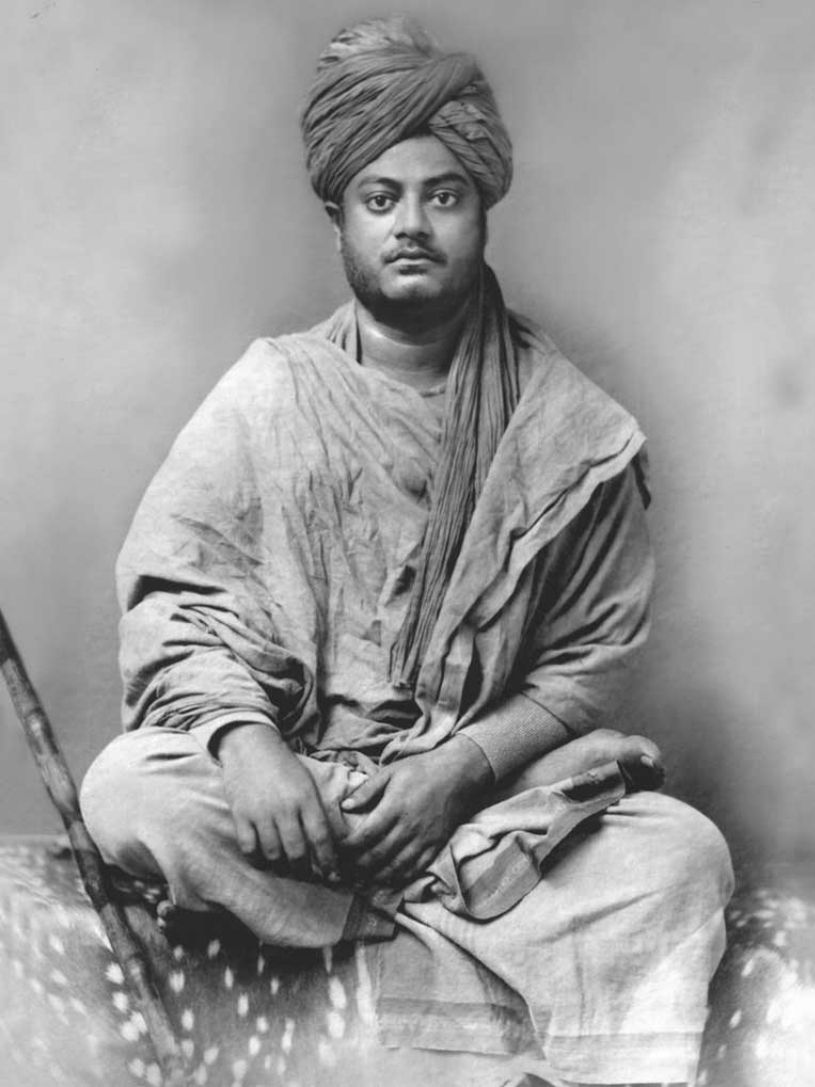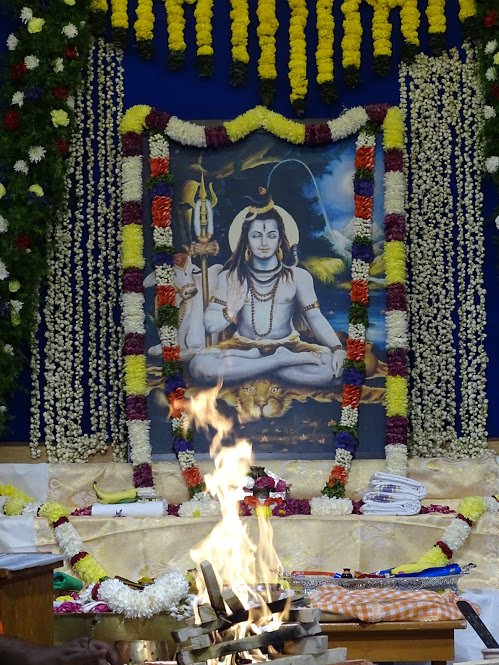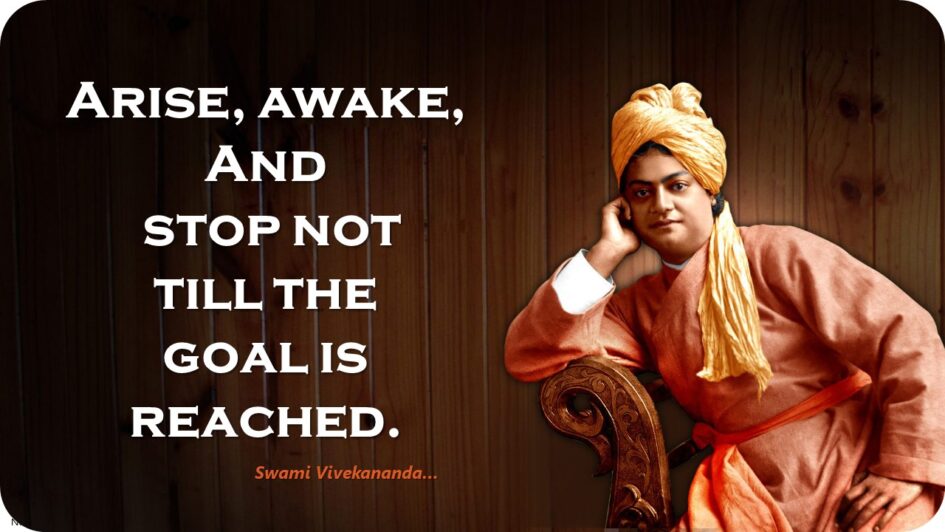Raja-Yoga - 1.13.(3 ) continued - Swami Vivekananda : Chicago 1893
================================================================
Wednesday, 30 Aug 2023 18;30.
PATANJALI'S YOGA APHORISMS
CHAPTER III
POWERS - Continued
==============================================================
26. By making Samyama on the Effulgent Light (I. 36 ), comes the knowledge of the fine, the obstructed, and the remote.
When the Yogi makes Samyama on that Effulgent Light in the heart, he sees things which are very remote, things, for instance, that are happening in a distant place, and which are obstructed by mountain barriers, and also things which are very fine.
भुवनज्ञानं सूर्ये संयमात् ॥२७॥
27. By making Samyama on the sun, (comes) the knowledge of the world.
चन्द्रे ताराव्यूहज्ञानम् ॥२८॥
28. On the moon, (comes) the knowledge of the cluster of stars.
ध्रुवे तद्गतिज्ञानम् ॥२९॥
29. On the pole-star, (comes) the knowledge of the motions of the stars.
नाभिचक्रे कायव्यूहज्ञानम् ॥३०॥
30. On the navel circle, (comes) the knowledge of the constitution of the body.
कण्ठकूपे क्षुत्पिपासानिवृत्तिः ॥३१॥
31. On the hollow of the throat, (comes) cessation of hunger.
When a man is very hungry, if he can make Samyama on the hollow of the throat, hunger ceases.
कूर्मनाड्यां स्थैर्यम् ॥३२॥
32. On the nerve called Kurma, (comes) fixity of the body.
When he is practising, the body is not disturbed.
मूर्धज्योतिषि सिद्धदर्शनम् ॥३३॥
33. On the light emanating from the top of the head, sight of the Siddhas.
The Siddhas are beings who are a little above ghosts. When the Yogi concentrates his mind on the top of his head, he will see these Siddhas. The word Siddha does not refer to those men who have become free — a sense in which it is often used.
प्रातिभाद्वा सर्वम् ॥३४॥
34. Or by the power of Prâtibha, all knowledge.
All these can come without any Samyama to the man who has the power of Pratibha (spontaneous enlightenment from purity). When a man has risen to a high state of Pratibha, he has that great light. All things are apparent to him. Everything comes to him naturally without making Samyama.
ह्रदये चित्त-संवित् ॥३५॥
35. In the heart, knowledge of minds.
सत्त्वपुरुषयोरत्यन्तासंकीर्णयोः प्रत्ययाविशेषाद् भोगः परार्थत्वात् स्वार्थसंयमात् पुरुषज्ञानम् ॥३६॥
36. Enjoyment comes from the non-discrimination of the soul and Sattva which are totally different because the latter's actions are for another. Samyama on the self-centred one gives knowledge of the Purusha.
All action of Sattva, a modification of Prakriti characterised by light and happiness, is for the soul. When Sattva is free from egoism and illuminated with the pure intelligence of Purusha, it is called the self-centred one, because in that state it becomes independent of all relations.
ततः प्रातिभश्रावणवेदनादर्शास्वादवार्ता जायन्ते ॥३७॥
37. From that arises the knowledge belonging to Pratibha and (supernatural) hearing, touching, seeing, tasting and smelling.
ते समाधावुपसर्गा व्युत्थाने सिद्धयः ॥३८॥
38. These are obstacles to Samadhi; but they are powers in the worldly state.
To the Yogi knowledge of the enjoyments of the world comes by the junction of the Purusha and the mind. If he wants to make Samyama on the knowledge that they are two different things, nature and soul, he gets knowledge of the Purusha. From that arises discrimination. When he has got that discrimination, he gets the Pratibha, the light of supreme genius. These powers, however, are obstructions to the attainment of the highest goal, the knowledge of the pure Self, and freedom. These are, as it were, to be met in the way; and if the Yogi rejects them, he attains the highest. If he is tempted to acquire these, his further progress is barred.
बन्धकारणशैथिल्यात् प्रचारसंवेदनाच्च चित्तस्य परशरीरावेशः ॥३९॥
39. When the cause of bondage of the Chitta has become loosened, the Yogi, by his knowledge of its channels of activity (the nerves), enters another's body.
The Yogi can enter a dead body and make it get up and move, even while he himself is working in another body. Or he can enter a living body and hold that man's mind and organs in check, and for the time being act through the body of that man. That is done by the Yogi coming to this discrimination of Purusha and nature. If he wants to enter another's body, he makes a Samyama on that body and enters it, because, not only is his soul omnipresent, but his mind also, as the Yogi teaches. It is one bit of the universal mind. Now, however, it can only work; through the nerve currents in this body, but when the Yogi has loosened himself from these nerve currents, he can work through other things.
उदानजयाज्जलपङ्ककण्टकादिष्वसङ्ग उत्क्रान्तिश्च ॥४०॥
40. By conquering the current called Udâna the Yogi does not sink in water or in swamps, he can walk on thorns etc., and can, die at will.
Udana is the name of the nerve current that governs the lungs and all the upper parts of the body, and when he is master of it, he becomes light in weight. He does not sink in water; he can walk on thorns and sword blades, and stand in fire, and can depart this life whenever he likes.
समानजयात् प्रज्वलनम् ॥४१॥
41. By the conquest of the current Samâna he is surrounded by a blaze of light.
Whenever he likes, light flashes from his body.
श्रोत्राकाशयोः सम्बन्धसंयमाद्दिव्यं श्रोत्रम् ॥४२॥
42. By making Samyama on the relation between the ear and the Akâsha comes divine hearing.
There is the Akasha, the ether, and the instrument, the ear. By making Samyama on them the Yogi gets supernormal hearing; he hears everything. Anything spoken or sounded miles away he can hear.
कायाकाशयोः सम्बन्धसंयमाल्लघुतूलसमापत्तेश्चाकाशगमनम् ॥४३॥
43. By making Samyama on the relation between the Akasha and the body and becoming light as cotton-wool etc., through meditation on them, the yogi goes through the skies.
This Akasha is the material of this body; it is only Akasha in a certain form that has become the body. If the Yogi makes a Sanyama on this Akasha material of his body, it acquires the lightness of Akasha, and he can go anywhere through the air. So in the other case also.
बहिरकल्पिता वृत्तिर्महाविदेहा ततः प्रकाशावरणक्षयः ॥४४॥
44. By making Samyama on the "real modifications" of the mind, outside of the body, called great disembodiedness, comes disappearance of the covering to light.
The mind in its foolishness thinks that it is working in this body. Why should I be bound by one system of nerves, and put the Ego only in one body, if the mind is omnipresent? There is no reason why I should. The Yogi wants to feel the Ego wherever he likes. The mental waves which arise in the absence of egoism in the body are called "real modifications" or "great disembodiedness". When he has succeeded in making Samyama on these modifications, all covering to light goes away, and all darkness and ignorance vanish. Everything appears to him to be full of knowledge.
स्थूल-स्वरूप-सूक्ष्मान्वयार्थवत्त्वसंयमाद्भूतजयः ॥४५॥
45. By making Samyama on the gross and fine forms of the elements, their essential traits, the inherence of the Gunas in them and on their contributing to the experience of the soul, comes mastery of the elements.
The Yogi makes Samyama on the elements, first on the gross, and then on the finer states. This Samyama is taken up more by a sect of the Buddhists. They take a lump of clay and make Samyama on that, and gradually they begin to see the fine materials of which it is composed, and when they have known all the fine materials in it, they get power over that element. So with all the elements. The Yogi can conquer them all.
ततोऽणिमादिप्रादुर्भावः कायसम्पत्तद्धर्मानभिघातश्च ॥४६॥
46. From that comes minuteness and the rest of the powers, "glorification of the body," and indestructibleness of the bodily qualities.
This means that the Yogi has attained the eight powers. He can make himself as minute as a particle, or as huge as a mountain, as heavy as the earth, or as light as the air; he can reach anything he likes, he can rule everything he wants, he can conquer everything he wants, and so on. A lion will sit at his feet like a lamb, and all his desires will be fulfilled at will.
रूप-लावण्य-बल-वज्रसंहननत्वानि कायसम्पत् ॥४७॥
47. The "glorification of the body" is beauty, complexion, strength, adamantine hardness.
The body becomes indestructible. Nothing can injure it. Nothing can destroy it until the Yogi wishes. "Breaking the rod of time he lives in this universe with his body." In the Vedas it is written that for that man there is no more disease, death or pain.
ग्रहण-स्वरूपास्मितान्वयार्थवत्त्वसंयमादिन्द्रियजयः ॥४८॥
48. By making Samyama on the objectivity and power of illumination of the organs, on egoism, the inherence of the Gunas in them and on their contributing to the experience of the soul, comes the conquest of the organs.
In the perception of external objects the organs leave their place in the mind and go towards the object; this is followed by knowledge. Egoism also is present in the act. When the Yogi makes Samyama on these and the other two by gradation, he conquers the organs. Take up anything that you see or feel, a book for instance; first concentrate the mind on it, then on the knowledge that is in the form of a book, and then on the Ego that sees the book, and so on. By that practice all the organs will be conquered.
ततो मनोजवित्वं विकरणभावः प्रधानजयश्च ॥४९॥
49. From that comes to the body the power of rapid movement like the mind, power of the organs independently of the body, and conquest of nature.
Just as by the conquest of the elements comes glorified body, so from the conquest of the organs will come the above-mentioned powers.
सत्त्वपुरुषान्यताख्यातिमात्रस्य सर्वभावाधिष्ठातृत्वं सर्वज्ञातृत्वञ्च ॥५०॥
50. By making Samyama on the discrimination between the Sattva and the Purusha come omnipotence and omniscience.
When nature has been conquered, and the difference between the Purusha and nature realised — that the Purusha is indestructible, pure and perfect — then come omnipotence and omniscienc
तद्वैराग्यादपि दोषबीजक्षये कैवल्यम् ॥५१॥
*****
To be continued
===============================================================
JAI HIND
JAI BHARATHAM
VANDHE MADHARAM
BHARAT MATHA KI JAI.
================================================================














Comments
Post a Comment